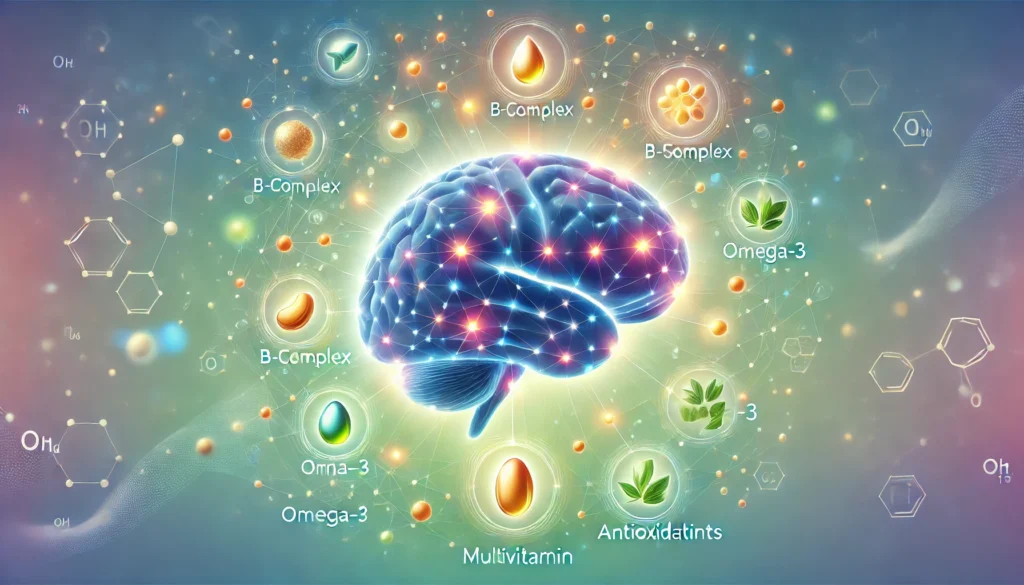The human brain is a marvel of nature. It’s the command center for our body, responsible for our thoughts, feelings, and movements.
Yet, like any other organ, it requires specific nutrients to function optimally. This is where brain multivitamins come into play.
Brain multivitamins are supplements designed to support cognitive function and overall brain health. They often contain a blend of vitamins, minerals, and other nutrients known to benefit the brain.
In this comprehensive guide, we delve into the world of brain multivitamins. We’ll explore their benefits, key ingredients, and the latest scientific research surrounding them.
Whether you’re a health coach, a science journalist, or a biohacker, this article aims to provide you with accurate, engaging, and practical advice. Let’s unlock the power of the brain together.
You may also like: Top Memory Supplements to Combat Dementia
Understanding Brain Multivitamins
Brain multivitamins are not your typical dietary supplements. They are formulated with nutrients specifically chosen for brain health. These nutrients play a crucial role in supporting cognitive functions like memory, focus, and mental clarity.
These specialized multivitamins cater to those looking to boost their mental performance. They are gaining popularity among professionals, students, and anyone wanting to maintain optimal brain health. They often combine several vitamins and minerals known for their cognitive benefits.
Key ingredients commonly found in brain multivitamins include B-vitamins, omega-3 fatty acids, and antioxidants. These nutrients contribute to brain cell health, mood regulation, and mental acuity.
Here are some important nutrients typically present in brain multivitamins:
- B-Vitamins: Essential for energy production and neurological function.
- Omega-3 Fatty Acids: Vital for maintaining brain cell integrity.
- Antioxidants: Help protect brain cells from oxidative stress.
- Vitamin D: Known for its role in mood stabilization and cognitive health.
Understanding the components and benefits of brain multivitamins can help you make informed choices. It’s important to select products backed by scientific research, ensuring you receive the most effective support for your brain health.
The Role of Vitamins and Minerals in Brain Health
Vitamins and minerals are essential for maintaining brain health. They contribute to numerous bodily functions, especially those that influence the brain. Their impact ranges from brain development in early life to cognitive maintenance in older age.
Certain vitamins, such as the B-group, are vital for converting nutrients into energy. They support proper neurological function, thereby enhancing cognitive abilities. B-vitamins also assist in forming neurotransmitters, crucial for mood regulation.
Minerals like magnesium influence brain activities, including memory formation and mood stabilization. Magnesium supports synaptic plasticity, allowing neurons to adapt and communicate efficiently. This adaptability is key in learning and memory retention.
Iron plays a different yet equally important role. It aids in transporting oxygen in the blood, ensuring the brain receives adequate oxygen. Iron deficiency can lead to cognitive impairments, highlighting its importance.
Here’s a quick rundown of vital nutrients for brain health:
- B-Vitamins: Converts food to energy, vital for neurotransmitter synthesis.
- Magnesium: Supports synaptic plasticity, aiding memory and learning.
- Iron: Ensures oxygen delivery to the brain, crucial for cognitive function.
- Zinc: Helps regulate neurotransmitter signals, influencing mood and cognition.
Vitamin D is another critical nutrient with profound effects on brain health. It’s linked to cognitive performance and emotional well-being. Often dubbed the “sunshine vitamin,” it plays a unique role in neural communication and the prevention of cognitive decline.
These vitamins and minerals collectively create a foundation for a thriving brain. They enable the mental agility required in today’s fast-paced world. Integrating them into your diet, either through food or multivitamins, can be an important step toward sustaining cognitive health throughout life.
Key Ingredients in Brain Health Supplements
When choosing brain health supplements, knowing the essential ingredients is vital. These components offer unique benefits that can enhance cognitive performance. Let’s delve into some of the most impactful ones.
Omega-3 fatty acids are often highlighted in brain supplements. They are structural components of brain cell membranes, crucial for cognitive function. Omega-3s, especially DHA, support brain development and plasticity.
Antioxidants play another important role. They combat oxidative stress, which can damage brain cells over time. Vitamin E and flavonoids are potent antioxidants often included in supplements for their protective effects.
Another key ingredient is choline, a precursor to the neurotransmitter acetylcholine. It supports memory and learning functions, making it an indispensable component of brain supplements. Choline is particularly beneficial for aging adults looking to maintain sharp cognitive abilities.
Herbs like Ginkgo Biloba and Bacopa Monnieri are also noteworthy. They have been used traditionally to support cognitive function and memory. These herbs improve blood flow to the brain, enhancing focus and alertness.
Here’s a list of key ingredients commonly found in brain health supplements:
- Omega-3 Fatty Acids: Support brain cell structure and function.
- Antioxidants (Vitamin E, Flavonoids): Protect against oxidative stress.
- Choline: Enhances memory and learning by supporting neurotransmitter production.
- Ginkgo Biloba and Bacopa Monnieri: Improve cognitive function and blood flow to the brain.
- L-Theanine: Found in green tea, it promotes relaxation and focus.
- Phosphatidylserine: Supports memory and cognitive function in the aging brain.
L-Theanine, an amino acid found in tea leaves, is another beneficial ingredient. It promotes relaxation without sedation, improving mental clarity. Combining it with caffeine can enhance focus and attention.
Each of these ingredients contributes to brain health in unique ways. Together, they offer a multi-faceted approach to cognitive enhancement, assisting those who seek to boost mental functions through scientifically-backed supplements.
The Science Behind Nootropics and Cognitive Enhancers
Nootropics, often called “smart drugs,” are substances that enhance cognitive function. These compounds have gained popularity for their ability to boost memory, focus, and overall brain performance. Let’s explore how they work and their potential benefits.
The primary aim of nootropics is to enhance mental clarity and concentration. They achieve this by increasing neurotransmitter activity. For example, some nootropics raise dopamine levels, promoting alertness and motivation. Others elevate serotonin, supporting mood stability and relaxation.
Nootropics also enhance cerebral blood flow. By improving blood circulation to the brain, they ensure a steady supply of oxygen and nutrients, critical for optimal cognitive function. This boost in blood flow can lead to sharper focus and quicker thought processes.
The science of nootropics encompasses various compounds. Some are natural, derived from plants and herbs, while others are synthetic. Among these, caffeine, L-theanine, and racetams are well-studied nootropics known for their cognitive-enhancing properties.
Here’s a list of common nootropics and their effects:
- Caffeine: Increases alertness and attention.
- L-Theanine: Promotes relaxation while maintaining focus.
- Racetams: Enhance memory and learning capabilities.
- Modafinil: Boosts wakefulness and reduces fatigue.
- Creatine: Supports energy production in brain cells.
It’s important to approach nootropics with care. While they hold promise for cognitive enhancement, their effects can vary among individuals. Consulting with a healthcare professional ensures safe and informed use. Understanding these cognitive enhancers is the first step in unlocking their potential benefits for brain health.

Personalized Nutrition for Optimal Brain Function
Personalized nutrition tailors dietary choices to an individual’s unique genetic makeup and health needs. By customizing nutrition, we can optimize brain health effectively. This approach recognizes that one-size-fits-all solutions may not achieve the best results for everyone.
Understanding personal nutritional requirements is crucial. Our bodies vary in how they metabolize nutrients and vitamins. For example, some people might need more omega-3 fatty acids to support brain function. Others might benefit from an increased intake of B-vitamins to reduce cognitive decline risks.
Genetic testing and assessments can guide personalized nutrition plans. These insights reveal specific nutrient deficiencies or genetic predispositions affecting brain health. With this information, we can develop targeted dietary strategies that enhance cognitive performance and mental well-being.
Integrating personalized nutrition with brain health supplements creates a comprehensive plan for cognitive enhancement. This synergy can promote increased mental clarity, improved memory, and sustained focus. By considering individual differences, personalized nutrition offers a robust pathway to achieving optimal brain function. It’s an evolving field, embracing science and technology to enhance our brain health journey.
Balancing Diet and Supplements for Brain Health
Balancing diet and supplements is key to supporting brain health. A nutrient-rich diet lays the foundation for cognitive vitality. Whole foods offer vitamins, minerals, and antioxidants crucial for brain function. Consuming a variety of fruits, vegetables, and whole grains is essential.
Despite the benefits of a healthy diet, some nutrients might still be lacking. This is where supplements play a vital role. Brain multivitamins bridge nutritional gaps, ensuring the brain receives adequate support. They augment dietary intake without replacing it.
Moreover, supplements should complement dietary choices, not contradict them. For example, a diet rich in omega-3s, like fatty fish, pairs well with supplements containing DHA and EPA. It’s important to consider the synergy between foods and supplements for optimal results.
Consulting healthcare professionals helps tailor a diet-supplement plan. They provide insights into individual nutritional needs. This guidance allows for an effective balance that promotes brain health and cognitive function. By harmonizing diet and supplements, individuals can enhance mental clarity and focus. This well-rounded approach supports overall well-being and brain longevity.
Potential Side Effects and Safety Considerations
While brain health supplements offer many benefits, they can also pose risks. Side effects may vary depending on the individual and specific supplement. Some common side effects include digestive issues, headaches, and insomnia.
It’s important to remember that supplements can interact with medications. These interactions may reduce the efficacy of either the supplement or the medication. This can lead to unintended health consequences. It’s crucial to consult healthcare providers before starting any new supplement regimen.
Safety considerations should not be overlooked. Quality and purity of supplements are of utmost importance. Choosing products with third-party certifications ensures they meet safety standards. Understanding potential side effects and prioritizing quality will help mitigate risks. This informed approach supports the safe use of brain multivitamins in pursuit of optimal brain health.

The Latest Research and Emerging Trends in Brain Health
Recent studies highlight the significant role of brain health supplements. Researchers are investigating how certain nutrients can enhance cognitive function. Vitamins and minerals like Vitamin D and Omega-3s are often in the spotlight.
A growing trend is personalized nutrition. This approach tailors supplements based on individual needs and genetic makeup. Personalized multivitamins are thought to improve brain function more effectively. This trend is gaining traction among health enthusiasts.
Nootropics, known as cognitive enhancers, are also garnering attention. These compounds aim to boost focus, memory, and mental clarity. The ongoing research suggests potential benefits for those seeking heightened mental performance.
Environmental factors are another area of interest. Studies examine how diet, lifestyle, and stress influence brain health. Researchers aim to create strategies integrating these elements with supplements. This holistic approach offers promising avenues for enhancing brain function.
Lifestyle Factors and Their Impact on Brain Function
Lifestyle choices significantly shape brain health. Regular physical activity can boost cognitive function. Exercise increases blood flow to the brain, enhancing memory and learning.
Sleep quality is another critical factor. Insufficient or poor-quality sleep can impair cognition and decision-making. Prioritizing good sleep hygiene supports mental clarity and focus.
Stress management is vital for maintaining optimal brain function. Chronic stress can negatively affect memory and learning abilities. Techniques like mindfulness and meditation can reduce stress and improve brain health.
Nutrition also plays a key role. A balanced diet rich in nutrients supports cognitive processes. The Mediterranean diet, for example, is linked with lower cognitive decline and better brain health. Integrating these lifestyle factors with brain health supplements creates a comprehensive approach to enhancing cognitive function.
Biohacking for Brain Health: Techniques and Technologies
Biohacking merges science and experimentation to enhance brain health. This trend emphasizes personal optimization of mental and physical performance. It includes a range of practices to sharpen mental acuity.
Nootropic supplements are at the forefront of biohacking for brain health. These compounds may improve memory, focus, and motivation. Many biohackers swear by ingredients like L-Theanine and Bacopa Monnieri.
In addition to supplements, technologies play a crucial role. Wearable devices now track brain activity and cognitive performance. These tools offer insights to tailor strategies for mental enhancement.
Some biohackers turn to unconventional methods like neurofeedback. This technique trains the brain to improve mental states and functions. By using real-time feedback, users can enhance attention and reduce stress levels. As biohacking evolves, its focus remains steadfast on discovering new ways to bolster cognitive health and performance.

Conclusion: Integrating Brain Multivitamins into a Holistic Health Regimen
Incorporating brain multivitamins into daily life can enhance cognitive wellness. They serve as a complement to a balanced lifestyle. However, they shouldn’t replace healthful living principles.
For optimal results, combine these supplements with proper diet, exercise, and stress management. Always consult healthcare providers when starting new regimens. A holistic approach ensures a sustainable path to brain health.
Further Reading
Healthline: Taking a Daily Multivitamin May Help Slow Cognitive Aging and Boost Memory
Time: Multivitamins Are Linked to Slower Brain Aging
Important Note: The information contained in this article is for general informational purposes only, and should not be construed as health or medical advice, nor is it intended to diagnose, prevent, treat, or cure any disease or health condition. Before embarking on any diet, fitness regimen, or program of nutritional supplementation, it is advisable to consult your healthcare professional in order to determine its safety and probable efficacy in terms of your individual state of health.
Regarding Nutritional Supplements Or Other Non-Prescription Health Products: If any nutritional supplements or other non-prescription health products are mentioned in the foregoing article, any claims or statements made about them have not been evaluated by the U.S. Food and Drug Administration, and such nutritional supplements or other health products are not intended to diagnose, treat, cure, or prevent any disease.


